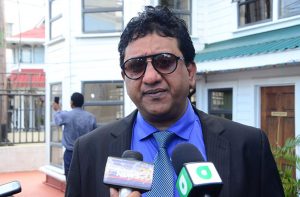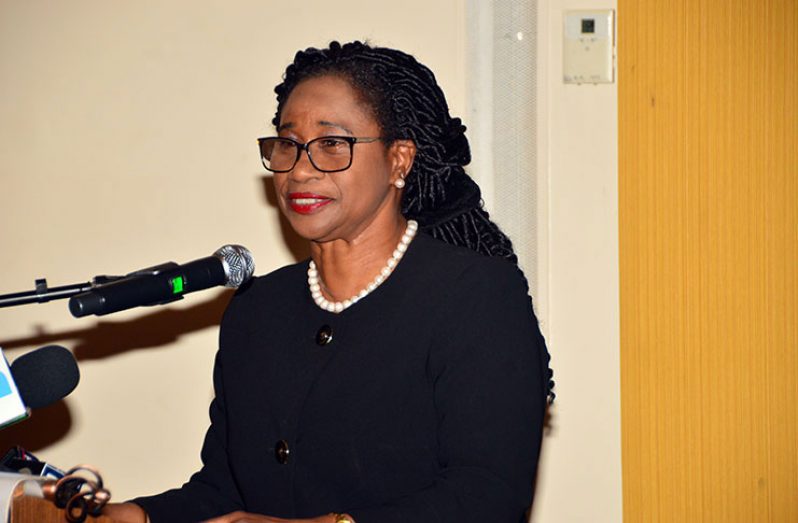ON Friday, the Court of Appeal will determine whether the No-Confidence Motion against the Government was validly passed, Acting Chancellor of the Judiciary, Yonette Cummings-Edwards announced on Wednesday.
The chancellor made the announcement at the conclusion of more than six hours of legal arguments on the validity of the vote cast by expelled Member of Parliament Charrandass Persaud when the No-Confidence Motion was put to a vote in the National Assembly on December 21, 2018. The oral arguments were heard in the appeal case of Compton Reid v The Speaker of the National Assembly, Charrandass Persaud, the Attorney General and Leader of the Opposition – the third of three constitutional cases.
Making the disclosure in the presence of Justices of Appeal Dawn Gregory and Rishi Persaud in the Court of Appeal, the Chancellor stated that decisions will be handed down in all three cases – the Attorney General v Christopher Ram and The Leader of the Opposition; The Attorney General v Speaker of the National Assembly, Leader of the Opposition and Joseph Harmon; and Compton Reid v The Speaker of the National Assembly, Charrandass Persaud, the Attorney General and Leader of the Opposition.

The full bench will commence its ruling on Friday from 15:00hrs in the Court of Appeal. Upon hearing the announcement, Senior Counsel Neil Boston, one of the legal counsel representing Compton Reid, asked the full bench to consider granting a Stay of Execution to freeze the decision of the High Court until the ruling but Justice Persaud indicated it was not necessary as he alluded to Section 40 of the Interpretation and General Clauses Act.
According to Section 40 (a) of the Interpretation and General Clauses Act, “in a law prescribing a period of days within which an act is to be or may be done, a period of days from the occurrence of an event shall be reckoned exclusively of the day on which the event occurs.”
Section 40 (c) also states that “where the day or the last day on which any act or proceeding is directed or allowed to be done or taken is a public holiday, the act or proceeding shall be considered as done or taken in due time if it is done or taken on the next day following not being a public holiday.”
Outside the courtroom, the attorneys in the three cases offered their interpretation based on Justice Persaud’s pronouncement.
“Based on what is called dies non, that is none days, in anytime span the 90 days would not expire before the decision. In other words, on Friday, the 90 days would not have expired…so there is no crisis,” Legal Counsel Robert Corbin explained. Corbin is representing Reid in association with Senior Counsel Rex McKay and Neil Boston.
With the decisions in the three cases set for Friday, there is no need for the court to proceed with hearing of arguments for the Conservatory Order and Stay of Execution which were applied for Reid and the Attorney General. Those arguments were expected to commence on Friday at 11:30hrs but have now been cancelled.
Weighing in on the issue, Boston said there is no need to proceed with the arguments because the timeline expires on Friday. “You start to count 90 days after the 21st (December, 2018) and under the Interpretation and General Clauses Act it is quite clear that Thursday is a non-dies, so Thursday would not be counted as part of the 90. Thursday is out. Today (Wednesday) is 89, tomorrow is out, and the 90 days will be on Friday,” he explained. He said contrary to notions peddled by some, there will be no constitutional crisis. “The sky will not fall tomorrow,” Senior Counsel Boston said.
Friday’s ruling can either see the No-Confidence Motion being overturned or upheld.
If the panel of judges upholds Chief Justice Roxane George’s decision that the No-Confidence Motion was validly passed in the National Assembly as declared by the Speaker, Dr. Barton Scotland, the Appellate Court has the power to extend the timeframe for the holding of General and Regional Elections in the absence of an extension by a two-third majority of all elected members of the National Assembly.

One of the country’s leading legal minds has said that the court, in keeping with the doctrine of necessity, has the powers to grant an extension to the constitutional deadline.
According to him, “like it or not, the court is in the driving seat” and will determine the way forward – it has the powers to do so. “The court will determine what happens if the time runs out or is about to run out. It will make that determination. No other organ in the state is capable of so doing,” he explained. Given the circumstances, the legal luminary said the court could depend on the doctrine of necessity, and grant an extension. “If it so happens that the court is in the process of resolving an issue or enquiring into an issue, and the time stipulated in the Constitution has been overshot, then the court could rely on the doctrine of necessity and give such extensions as are required in the circumstances,” he further explained.
President David Granger said he will be guided by the Court of Appeal and GECOM, in his latest address to the nation. “I rely on the Commission’s readiness, the provision of funds and the expansion of time to conduct credible elections by the National Assembly. I rely on the outcome of legal challenges by the Court of Appeal. I rely, also, on public confidence in the institutions responsible for executing these processes. They demand political cooperation, not confrontation,” the President said.
The Guyana Elections Commission (GECOM) said it needs approximately eight months to prepare for elections. The ‘perceived’ passage of the No-Confidence Motion has triggered the need for early elections, but Government has challenged it on several grounds.
The Attorney General Basil Williams and a battery of lawyers, in a series of convincing arguments, submitted that the Opposition did not secure an absolute majority as required by Article 106 (6) and (7) of the Constitution for a motion to be effectively passed. Reid, a farmer from Berbice, has challenged the validity of the motion on the ground that Charrandass Persaud breached the Constitution when he failed to inform the Speaker of the National Assembly that he had intention of voting against the list he was extracted from. Charrandass Persaud presence in the National Assembly was also in breach of the Constitution on the basis that he has dual citizenship.



.jpg)











